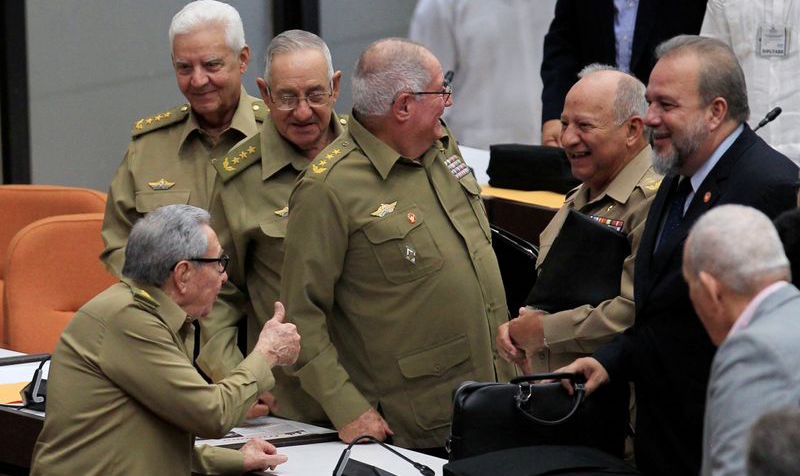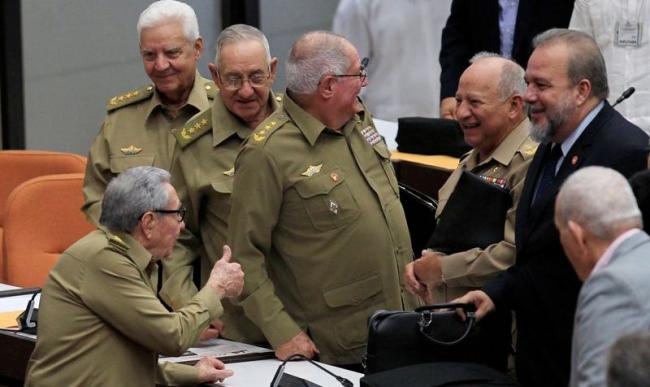In the final months of 2019 we bore witness to an unexpected wave of popular discontent against presidents accused of manipulating democratic discourse and trampling the people's rights. In all these cases presidents who came to power through democratic elections ended up calling on the military or police to quell the protests and guarantee their continuation in office.
Actually, this did not start last October. A quick look back and we see the President of Guatemala, Jimmy Morales, taking office in January of 2016 surrounded by military brass. Also, in January of this year former Army captain Jair Bolsonaro assumed the presidency of Brazil. His rhetoric containing religious overtones and an apology of the dictatorships of the 70s, he went on to buttress his power by appointing more than 140 officers to government posts.
In the most recent events Iván Duque, the president of Colombia, lost popular support due to his repression of protests in Bogotá, Cali, Medellín and Barranquilla, sparked by increase in the price of basic groceries.
Ecuador’s President Lenin Moreno, meanwhile, announced a series of economic measures that triggered protests of such a magnitude in Quito that the ruler had to take refuge in Guayaquil, and withdraw them. Finally, he called for reconciliation, but surrounded by police and military.
In early October Peru's President Martín Vizcarra, along with the heads of the Armed Forces and the Police, appealed to the people after dissolving the Congress; and in Chile Sebastián Piñera put police on the streets and decreed a curfew in response to protests against the increase in public transport prices.
Governments considered progressive also resorted to the military to ensure their survival. In Bolivia, Evo Morales went to great lengths to win over the military, who went from considering him a traitor to his country, to an architect of political and economic stability. These allied forces, however, quickly accommodated the authorities and agreed to repress the people. In Venezuela the Armed Forces are the cornerstone of the "Bolivarian Project". With a model that closely resembles the Cuban one, the military there controls the economy, finance and illegal businesses.
A few days ago the President of Cuba, Miguel Díaz-Canel, appointed the former coronel Manuel Marrero as Prime Minister. Marrero has not exactly stood out for his military career, as he has been head of the technical investment group, deputy director and general manager of the Rio de Luna hotel, and deputy delegate of the Gaviota military company for the eastern provinces.
Marrero, however, combines the economic and political strengths of post-Castroism: he has worked in the military apparatus that controls the vital Tourism sector. In 1999 he became vice-president of the Gaviota Tourism Group and, in 2001, its president. In 2017 he received the Tourism Excellence Award. From 2004 to 2019 he was Minister of Tourism.
Tourism is key in the economic sphere, and the Armed Forces are essential in the political realm, and control the tourism business.
Marrero's appointment surprised many, since he was a little-known official and not one of the candidates who were envisaged as the president's second-in-command. 594 deputies of the National Assembly of Cuba, however, ratified him.
Díaz-Canel also appointed Brigadier General José Amado Cabrera Guerra –a confidante of Raúl Castro, who assigned him these duties in 2009– as Secretary of the Council of Ministers, making him a virtual chief of staff.
Cuba's Council of Ministers has other officers too: the Minister of the Revolutionary Armed Forces (FAR), and Army General Leopoldo Cintra Frías; and Vice Admiral Julio César Gandarilla Bermejo, as Minister of the Interior. They are joined by members of the Central Committee of the Communist Party of Cuba, including Army General Álvaro López Miera, who is also the First Deputy Minister of the FAR and Chief of the General Staff; and Army General Ramón Espinosa Martín, deputy minister of the FAR, among others, all this evidencing the military's influence on political decisions.
The photo of Marrero’s designation as prime minister speaks for itself, pointing to a reality that many scorn, others do not know, and some seek to hide: in Cuba, the military no longer prepares for combat, but rather to control the economy and protect the president . Is it any coincidence that a member of GAESA, the powerful business conglomerate that manages much of the Cuban economy, has been tapped for the state's second highest post?
This is open to two possible interpretations. On the one hand, skeptics only detect a mirage of power distribution, and are convinced that nothing is changing. Most Cubans, meanwhile, have still not expressed their opinions about this designation, whether out of fear, complacency, fatigue, or because its is irrelevant to their daily struggles.
Even more than this investiture of a relatively obscure official, it is surprising that, although the military is still one of the institutions that calls the shots on the island, little is really known about the Revolutionary Armed Forces (FAR).
In Latin America, the spread of democracy once managed to confine the military to its barracks. In recent years, however, the Armed Forces have become more engaged in politics, and meddled more in decision making. Concern about democratic, civilian control of the armed forces is waning. In regimes of doubtful democratic legitimacy, this concept of civil control, widely debated in the literature, is disparaged. Perhaps in this regard Argentina may be an exception, as democratic governments' human rights policies there have greatly discredited the military.
However, both for Cuba and for the other countries in the region, this biased and gradual rise of the military's participation in society and the state has dire consequences. An institution that maintains a monopoly on the use of public force poses a potential threat to human rights, and constitutes a possible source of institutional imbalance.
In most Latin American countries certain sectors of society bitterly recall the ineptitude, corruption, and, especially, the repression and violence instituted by the military. They are aware that armed forces should be created and trained to protect a country and all its citizens – not government regimes. This is an ongoing issue, one which the press, intellectuals, and social and political groups must constantly monitor.
Unfortunately, in 2019 democratic countries like Chile, Ecuador, Brazil and Colombia saw a greater militarization of their politics, as in Cuba and Venezuela. Instead of democratic progress, the region is being militarized.
Cuba, and also Venezuela, empower the military as sentinels of their regimes, assigning them privileged functions. The paradox is that, at the same time, they corrode their political systems and frustrate any progress towards these regimes' professed revolutionary aims.
Only active engagement by civil society, at the national and regional levels, can curb this intensification of military functions, which damages the lives of citizens.
On the authors:
Rut Diamint: Principal Investigator, Conicet, Professor at the Universidad Torcuato Di Tella, Buenos Aires, Argentina.
Laura Tedesco: Vice-Dean of Humanities and Social Sciences at Saint Louis University / Madrid Campus

